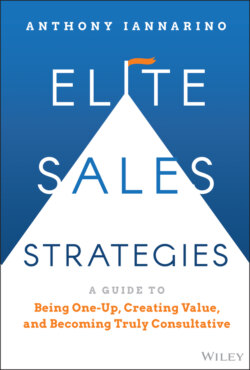Читать книгу Elite Sales Strategies - Anthony Iannarino - Страница 21
True Confessions of a Legacy Salesperson
ОглавлениеI started making cold calls for a nonprofit when I was fifteen years old. After two weeks, I found a much better job at a skating rink, so I quit. During that two-week period, I had scheduled two events—two more than all of my coworkers combined. There is no way that I was especially good at the work; my success was due to my work ethic and my ability to suffer without complaint.
Not too many years later, when I was forced into an outside sales role, I was taught and trained to present my company by walking the client through a huge binder that was designed to answer both classic legacy questions: “why us” and “why our solution.” I literally read the binder to the poor, suffering souls who were too polite to throw me out of their office. One prospect was basically catatonic when I left her office. I really hope she had a good health plan.
When the $4 billion company I worked for decided to train me, they taught me to ask my prospective clients for a single order, the old “get the camel's nose under the tent” strategy. (It's cold in the desert at night, and when you allow a camel to put his nose under the tent, you end up with a not-so-cuddly animal sleeping next to you.) In a role play, however, I tried to convince the regional vice president to give me all of her orders. After the exercise, I was taken into another room and told that I would no longer be allowed to participate in the training. The regional vice president was concerned that I was “scaring the salespeople who were afraid to ask for an order.” My manager laughed at the situation, as we had fun taking over entire accounts, preferring to acquire clients instead of orders. It would take me nine full years of sales before I was able to help my clients adjust more than the name of their supplier. Eventually, though, I found my way to One-Up, and I haven't looked back.
Being One-Up is vital simply because there is no reason for a client to ever take advice from someone in the One-Down position, especially when it comes to making important decisions and pursuing better results. What value is a salesperson who knows less than the client they are trying to help? In Nancy Duarte's excellent book Resonate, she suggests that your client is Luke Skywalker while you are Yoda. Your client is the hero, albeit one who is rather clueless, presently inadequate for their mission, and a bit of a fixer upper. You, however, have greater experience and the ability to provide the help your clients need.
Personally, I prefer Obi-Wan Kenobi to Yoda; maybe it's the white beard. In either case, you have to provide insights that allow your client to succeed in their mission. The starting point for making a One-Up sale is demonstrating your expertise in the sales conversation with your prospective client, leading with the insights your contacts need. You need not worry about sharing your insights or providing risky “free consulting,” as it's far riskier to pursue a legacy approach. Besides, you are going to teach your client everything they know, but not everything you know.
